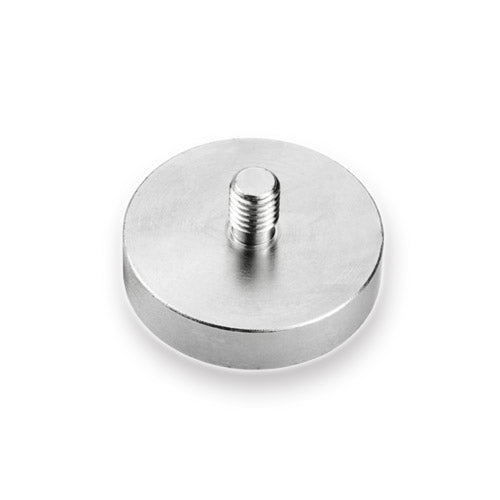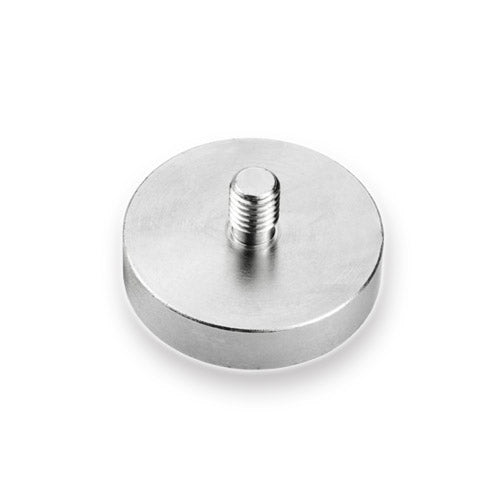Great Magnets
These work great
Product code: AMFYPC42


Prices are GST Incl.
Volume pricing available on requestAustralia's Leading Supplier
Shipping Worldwide*
30 Day Returns
Same Day Dispatch*
This rare earth male threaded pot magnet has a diameter of 42mm, a total height of 20mm and a magnet housing thickness of 9mm. It has a M6 thread with an external boss of 11mm. This male threaded magnet has a pull force of 68kg and a weight of 84g. It is identified by the Amf magnets part number AMFYPC42.
Our Male Thread Holding Pot magnets are designed to be attached with a washer and nut. These neodymium holding pot magnets are high strength magnets in a mild steel casing that gives extra protection against chipping or cracking. Due to the protective cover on these pot magnets, magnetic flow is repelled and forced to the base surface which becomes ideal for holding and suspending objects.
| ModelNo. | DØ | M | H | h | Holding force (kg) | Weight (g) |
| AMFYPC10 | 10 | 3 | 12 | 5 | 2.2 | 3.5 |
| AMFYPC12 | 12 | 3 | 13 | 5 | 3.2 | 5 |
| AMFYPC16 | 16 | 4 | 13 | 5 | 5.5 | 7.5 |
| AMFYPC20 | 20 | 4 | 15 | 7 | 9 | 16 |
| AMFYPC25 | 25 | 5 | 17 | 8 | 22 | 30 |
| AMFYPC32 | 32 | 6 | 18 | 8 | 34 | 45 |
| AMFYPC36 | 36 | 6 | 18 | 8 | 41 | 57 |
| AMFYPC42 | 42 | 6 & 8 | 20 | 9 | 68 | 84 |
| AMFYPC48 | 48 | 8 | 24 | 11.5 | 81 | 130 |
| AMFYPC60 | 60 | 8 | 30 | 15 | 113 | 254 |
| AMFYPC75 | 75 | 10 | 34 | 15 | 164 | 550 |
No FAQ available

NB: Ranges are indicative for product category, please check individual products for specic values within that range.



The most common coating for Neodymium magnets is Nickel + Copper + Nickel (Ni + Cu + Ni). This coating offers the magnet relatively good protection from corrosion and passive applications. If the magnet will be exposed to moisture or liquid then consider the use of an organic coating such as Epoxy. A hard wearing coating, Epoxy is suited to applications where the magnet will come under some friction or knocking.

Magnets are readily available in Blocks, Discs, Cylinders & Rings. AMF Magnetics specializes in the supply of short-run prototype magnets including Arc Segments, various magnetic orientations etc. If you need a magnet size that we don't carry in stock, submit a Design-a-Magnet enquiry for a quote on your custom magnet design.

Neodymium magnets are offered in several different grades. The first section N30-54 has an operating temperature of up to 80 degrees. Most of our stock only goes up to N38. The second section, denoted with the "M" prefix after the grade has an operating temperature 100 degrees. After this the grades are "H", "SH", "UH" & "EH". In order for the magnet to withstand a higher operating temperature, during production more of the raw material PrNd is incorporated as these elements have a naturally occurring resistance to high temperatures.
This rare earth male threaded pot magnet has a diameter of 42mm, a total height of 20mm and a magnet housing thickness of 9mm. It has a M6 thread with an external boss of 11mm. This male threaded magnet has a pull force of 68kg and a weight of 84g. It is identified by the Amf magnets part number AMFYPC42.
Our Male Thread Holding Pot magnets are designed to be attached with a washer and nut. These neodymium holding pot magnets are high strength magnets in a mild steel casing that gives extra protection against chipping or cracking. Due to the protective cover on these pot magnets, magnetic flow is repelled and forced to the base surface which becomes ideal for holding and suspending objects.
| ModelNo. | DØ | M | H | h | Holding force (kg) | Weight (g) |
| AMFYPC10 | 10 | 3 | 12 | 5 | 2.2 | 3.5 |
| AMFYPC12 | 12 | 3 | 13 | 5 | 3.2 | 5 |
| AMFYPC16 | 16 | 4 | 13 | 5 | 5.5 | 7.5 |
| AMFYPC20 | 20 | 4 | 15 | 7 | 9 | 16 |
| AMFYPC25 | 25 | 5 | 17 | 8 | 22 | 30 |
| AMFYPC32 | 32 | 6 | 18 | 8 | 34 | 45 |
| AMFYPC36 | 36 | 6 | 18 | 8 | 41 | 57 |
| AMFYPC42 | 42 | 6 & 8 | 20 | 9 | 68 | 84 |
| AMFYPC48 | 48 | 8 | 24 | 11.5 | 81 | 130 |
| AMFYPC60 | 60 | 8 | 30 | 15 | 113 | 254 |
| AMFYPC75 | 75 | 10 | 34 | 15 | 164 | 550 |
No FAQ available

NB: Ranges are indicative for product category, please check individual products for specic values within that range.



The most common coating for Neodymium magnets is Nickel + Copper + Nickel (Ni + Cu + Ni). This coating offers the magnet relatively good protection from corrosion and passive applications. If the magnet will be exposed to moisture or liquid then consider the use of an organic coating such as Epoxy. A hard wearing coating, Epoxy is suited to applications where the magnet will come under some friction or knocking.

Magnets are readily available in Blocks, Discs, Cylinders & Rings. AMF Magnetics specializes in the supply of short-run prototype magnets including Arc Segments, various magnetic orientations etc. If you need a magnet size that we don't carry in stock, submit a Design-a-Magnet enquiry for a quote on your custom magnet design.

Neodymium magnets are offered in several different grades. The first section N30-54 has an operating temperature of up to 80 degrees. Most of our stock only goes up to N38. The second section, denoted with the "M" prefix after the grade has an operating temperature 100 degrees. After this the grades are "H", "SH", "UH" & "EH". In order for the magnet to withstand a higher operating temperature, during production more of the raw material PrNd is incorporated as these elements have a naturally occurring resistance to high temperatures.

The Pull Force listed for each magnet is based on lifting 10mm thick steel from a horizontal surface. Magnets on a vertical surface (of 10mm thick steel) are generally able to hold around only 30% of the pull force listed in the product description. This is due to the effects of gravity and the lack of friction between the surface and the shiny magnet. Read More